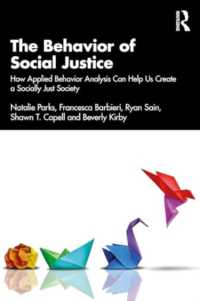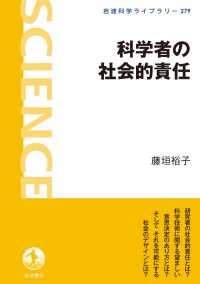Full Description
This edited volume provides new, nuanced answers to questions concerning the complex nature of political trust and distrust, exploring the role they play within democratic governance and the implications that varying degrees of trust can have on relations between citizens and institutions.
In times of uncertainty and crisis, trust and distrust become a particularly important topic of public concern and scientific interest. Presenting findings from a research project spanning seven European countries, the book explores the meaning and role of institutional trust and distrust, analyses individual manifestations, inquiries into arenas of trust formation and contestation, and discusses scenarios and implications. The authors present fresh theoretical and empirical insights by corroborating a co-presence of institutional trust and distrust and, crucially, propose a relational approach that considers the interplay between (dis)trusting citizens and institutions at the individual and collective level.
An important and original contribution to understandings of political trust, it will be an essential resource for scholars, researchers and upper-level students of political sociology, political science, psychology and media studies, with interests in understanding forms of political trust and distrust, and their conditions and implications.
Contents
1. Introduction: Paths and Challenges in the Study of Trust and Distrust in Governance Part I: Individual-level Relations: Citizens and Governance 2. The Developmental Shift in Adolescents' Political Institutional (Dis)Trust and the (Un)Trustworthiness Criteria in COVID-19 Institutional Decision-Making: A Mixed-Methods Study 3. Exploring the Different Faces of Political Trust and Distrust: A Comparative Analysis of Survey Data Part II: Collective-level Relations: Arenas and Contestations 4. Building User Trust Through Frontline Work: The Context of Social Welfare Institutions 5. Navigating Institutional (Dis)trust: Perspectives of Democratic Social Movements and Effects on Cooperation with Institutions 6. The News Media as an Arena of Trust Contestation During the Pandemic Part III: Addressing Trust and Distrust: Policies, Practices, and Deliberations 7. European Civil Society Organisations' Trust in the EU Institutions: An Expectation of an Open and Informed Policy Debate 8. We Trust Politicians if We Can See Them: Findings from a Cross-Country Experimental Study through Online Deliberative Polls 9. Conclusion: Institutional Frameworks, Relational Dynamics, and Democratic Implications of Trust and Distrust








